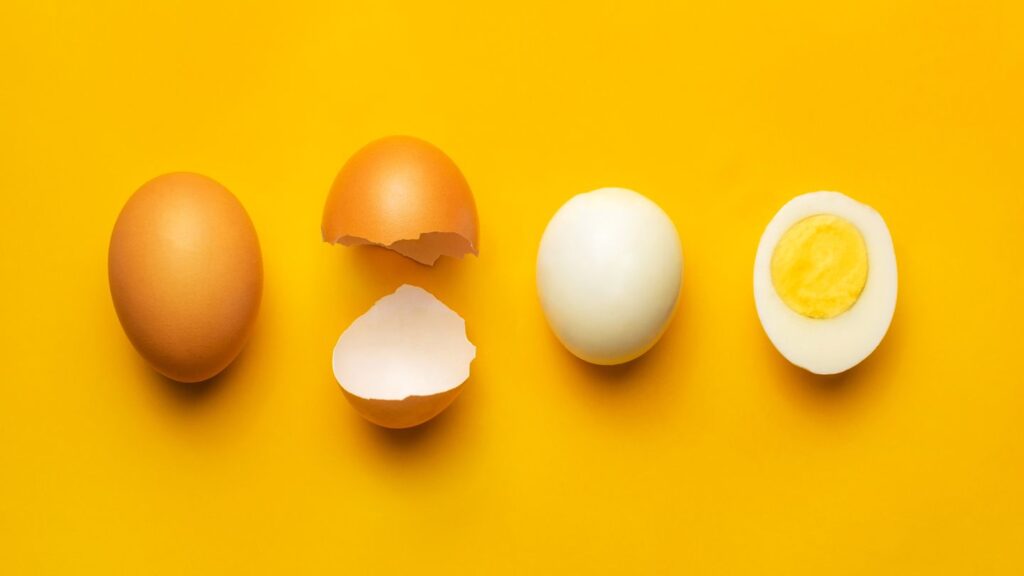Have you ever wondered how many calories in an egg? Most people often think that eggs (both raw and cooked) have the same number of calories. However, that’s not the case. This article aims to clearly outline the calories available in eggs, in addition to helping you decide on how you will have your eggs.
Eggs are superfoods, because of their high content of Protein, Vitamins, Omega-3 fatty acids, and Minerals. While eggs have about 200 mg of cholesterol, studies have proven that eating an egg daily can prevent the risk of heart disease in a healthy person.
How many Calories (Cal) are in an Egg?
Eggs contain two parts essentially, the egg white and the egg yolk. Either of the parts has an important nutritional value among different types of people, i.e. athletes, pregnant women, diabetic individuals, etc.
So how many calories are available in an egg? The answer to that is not only dependent on how you cook the egg, but also the size of the egg. We will look at each of these two determinants to enable you to get the clear picture. Let’s whisk some information.

Preparing Eggs and Calorie Levels
Egg White
Egg white is the viscous component in the egg, also called albumen, because of the parent protein composition albumin. The main function of this albumin layer is to protect, provide nutrition, and growth of the embryo, during incubation.
The calories present in an egg white is about 16-18 Cal. However, it’s dependent on the size and roughly the age of the egg. On the contrary, calories in the egg white are less than those in the yolk.
Egg Yolk
Egg yolk is yellow, sometimes orange part of the egg. It contains more omega-3 fat and cholesterol. The calories present in the yolk is about 58-60 Cal. The Egg Yolk is highly nutritious since it is packed with protein. You can say it is a “protein bomb.”
The yellow color is due to the presence of Carotenoids.
Fun Fact: Only a healthy hen has the potential to store carotenoids in its yolk. The brightness of the yolk’s yellow color is an indication that a healthy hen laid the egg, therefore making it fit for consumption.
Whole Raw Eggs
It’s a popular food for bodybuilders and athletes. Since they contain high levels of calories and proteins, they are helpful to improve stamina. However, consumption of raw eggs is not good for everyone, because they can cause an upset stomach. Consumption of whole raw eggs is also not good for pregnant women and generally people with a weak digestive system.
A whole raw egg, together with its components, stores about 76-78 Cal. However, it’s subject to change in relation to size.
Soft-boiled Eggs
Soft boiled eggs are highly nutritious since all nutrients are retained in the boiling process. A whole soft-boiled egg contains about 78-80 Cal. In addition, it has saturated fats (2mg of its total 7mg of fats).
The calories available from soft-boiled eggs are dependent on the mode of boiling and the time used for boiling it. For effectiveness, consume it immediately to get the most out of it.
Hard-boiled Eggs
As the term “hard-boiled” suggests, they are cooked longer than their counterpart soft-boiled eggs, and preferably in boiling water. This complete cooking of the egg prevents the possibility of infection to the individual consuming it. The calories in hard-boiled eggs are between 78-81 Cal.
See Also: 10 Easy DIY Cool Cork Board Project Ideas

Scrambled Eggs/ Fried eggs
Scrambled eggs calories reach close to 100 Cal. This is due to the mode of preparation. You make them by breaking the hard shell, stirring the egg contents and cooking it on low flame, sometimes with butter or cheese.
The addition of butter or cheese and oils are responsible for the addition of the extra calories.
Poached Eggs
Poached eggs like their hard-boiled counterparts contain about 79-81 Cal.
Egg Sandwich or Egg Salad with Mayonnaise
Lastly, if you find egg sandwiches, or mayonnaise containing egg salads tasty like me, you should be careful. Given the fact, they have the largest amount of calories. They contain around 556 Cal.
Egg Size and Calorie levels
When it comes to egg sizes, the larger the egg, the more calories it possesses.
Conclusion
Overall, the crucial path to staying fit and healthy is to possess the right amount of calories in your diet. Adults usually require close to 2000 cal per day. The excess calories can be “burned”, or you can get rid of them through exercising regularly.
However, the calories will not be excess if consumed in the right amounts. Eggs not only provide us with the essential, calories but also with crucial vitamins and minerals.
More to read: Best Buyers Agency Sydney

